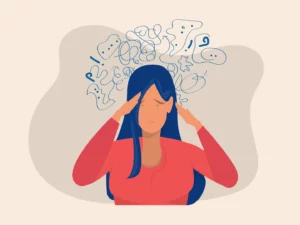Did you know that there are different types of ADHD? Attention Deficit Hyperactivity Disorder is a condition that can affect people in different ways. In this blog post, we will discuss the three main types of ADHD: Predominantly Inattentive Type, Predominantly Hyperactive-Impulsive Type, and Combined Type. We will also talk about some of the symptoms associated with each type. If you think that you or someone you know may have ADHD, it is important to get diagnosed by a professional.
Contents
What Is ADHD?

Attention Deficit Hyperactivity Disorder is a condition that is characterized by problems with focus, hyperactivity, and impulsiveness. ADHD can affect people of all ages, but it is most commonly diagnosed in children. Symptoms of ADHD can vary from person to person. Some people with ADHD may only have problems with focus, while others may be very hyperactive and impulsive. It is one of the most common mental illnesses affecting children. Therefore, More research is required to help these children.
Types of ADHD
On the basis of symptoms, ADHD is divided into three types:
Impulsive/Hyperactive Type ADHD
This type is characterized by problems with impulsiveness and hyperactivity. People with this type of ADHD may have trouble sitting still, waiting their turn, or controlling their emotions. They may also take risks without thinking about the consequences.
Inattentive Type ADHD
This type is characterized by problems with focus and attention. People with this type of ADHD may have trouble paying attention, following instructions, or finishing tasks. They may also daydream a lot or seem to be “in a world of their own.”
Combined Type ADHD
This type of ADHD is characterized by problems with both focus and hyperactivity/impulsiveness. People with this type of ADHD may have trouble paying attention, sitting still, or controlling their emotions. They may also take risks without thinking about the consequences.
How Are They Different?
The different types of ADHD can cause similar problems, but they can also affect people in different ways. For example, someone with the Impulsive/Hyperactive Type may have trouble sitting still in class, while someone with the Inattentive Type may have trouble paying attention to the teacher. Someone with the Combined Type may have both of these problems.
Co-occurring Disorders
People with ADHD may also have other mental health disorders, such as anxiety or depression. These disorders are referred to as “co-occurring” disorders. Therefore, Having a co-occurring disorder can make it more difficult to manage ADHD symptoms.
Some of the disorders that co-occur with ADHD are:
- Anxiety disorders
- Depression
- Bipolar disorder
- Substance abuse disorders
- Eating disorders
- Conduct disorder
- Tourette’s syndrome
- Obsessive Compulsive disorder
- Oppositional defiant disorder
- Disruptive behaviour disorder
- Learning disabilities
If you think that you or someone you know has ADHD, it is important to get diagnosed by a professional. A professional can help you understand your symptoms and develop a treatment plan
Symptoms

The symptoms of ADHD can vary from person to person. Some people with ADHD may have only a few symptoms, while others may have many. The severity of symptoms also varies from person to person.
Inattention
Inattention presents itself as:
- Trouble paying attention to details or making careless mistakes
- Trouble sustaining attention during tasks or play
- Trouble listening when spoken to directly
- Trouble following through on instructions
- Trouble with organization
- Avoids or dislikes tasks that require sustained mental effort
- Tendency to lose things
- Forgetting things
Also, Inattention may be presented as Daydreaming and Getting easily distracted
Hyperactivity/Impulsivity
Hyperactivity presents itself as:
- Fidgeting or squirming
- Difficulty remaining seated
- Excessive talking
- Difficulty waiting in line or taking turns
- Interrupting or intruding on others
- Acting without thinking
- Blurting out answers before hearing the whole question
Hyperactivity may also be presented as restlessness or an inability to relax.
Impulsivity may also be presented as impatience or a tendency to take risks.
Causes

The exact cause of ADHD is unknown, but it is believed to be caused by a combination of different factors
- Alcohol Use During Pregnancy: Drinking alcohol during pregnancy can increase the risk of having a child with ADHD because alcohol has been shown to interfere with the development of the brain.
- Smoking During Pregnancy: Smoking during pregnancy can also increase the risk of having a child with ADHD because nicotine has been shown to interfere with the development of the brain.
- Exposure to Lead: Children who are exposed to lead are more likely to develop ADHD because lead has been shown to damage the brain.
- Brain Injury: Children who have suffered a brain injury are more likely to develop ADHD because the injury can damage the parts of the brain that are responsible for attention and impulsivity.
- Low Birth Weight: Low birth weight is a risk factor for ADHD because it has been linked to problems with brain development.
- Genetics: ADHD can run in families, so it is believed that genetics may play a role in its development.
- Premature Birth: Premature birth is another risk factor for ADHD because it can also lead to problems with brain development.
Research does not support that ADHD is caused by eating too much sugar, watching too much television, parenting, or social and environmental factors such as poverty or family chaos. Although it does play a role in making symptoms worse.
Effects

ADHD can cause problems in many areas of life. If left undiagnosed and untreated, ADHD can have long-term effects, such as:
- Unsuccessful in school
- Problems with employment
- Trouble sustaining relationships
- Increased risk of accidents and injuries
- Substance abuse
- Teen pregnancy
- Legal problems
ADHD can also lead to emotional problems such as:
- Anxiety
- Depression
- Frustration
- Inability to form lasting bonds
- Irritability
- Low self-esteem
- Problems with anger
There is no cure for ADHD, but there are treatments that can help people manage the symptoms.
Diagnosis

Most commonly, ADHD is diagnosed in children between the ages of six and twelve. However, it can be diagnosed in adults as well.
If you suspect that your child may have ADHD, the first step is to talk to your child’s doctor. The doctor will ask about your child’s symptoms and medical history.
There is no test that can diagnose ADHD. Instead, the diagnosis is made based on a combination of factors, including:
- A medical history
- A physical exam
- Observations
- A review of symptoms
- Tests that rule out other conditions
The doctor may also want to talk to your child’s teachers or other adults who have seen your child in action. If your child is diagnosed with ADHD, the doctor will work with you to create a treatment plan.
Treatment

There is no one-size-fits-all treatment for ADHD. The best treatment plan will be unique to each individual.
Treatment options available are:
- Psychotherapy: Psychotherapy, also known as counseling or therapy, can help people with ADHD learn how to manage their symptoms.
- Behavioral therapy: Behavioral therapy can help people with ADHD learn how to change their behavior.
- Social skills training: Social skills training can help people with ADHD learn how to interact with others.
- Parenting Skills training: Parenting skills training can help parents learn how to better manage their child’s ADHD.
- Cognitive behavioral therapy: Cognitive behavioral therapy can help people with ADHD learn how to change their thinking patterns.
- Support group: Support groups can provide people with ADHD with support and information. It can help patient feeling less lonely.
These treatment methods can be taken up with or without medication.
Medications

Medications can help people with ADHD by improving their ability to focus and pay attention.
Two types of medication for ADHD are:
- Stimulants: Stimulants are the most commonly prescribed type of medication for ADHD. They work by increasing levels of dopamine and norepinephrine in the brain. some examples are Amphetamine, Dextroamphetamine, and Lisdexamfetamine.
- Non-stimulants: Non-stimulants are another type of medication for ADHD. They work by increasing levels of norepinephrine in the brain. Some examples are Atomoxetine, Clonidine, and Guanfacine.
These medications can have side effects, such as:
- Headache
- Dizziness
- Nausea
- Insomnia
- Decreased appetite
- Dry mouth
- Anxiety
- Irritability
- Weight loss
- Increased heart rate
Medications can improve symptoms of ADHD, such as:
- Inattention
- Hyperactivity
- Impulsivity
- Disorganization
Therefore, medications can help people with ADHD lead normal, productive lives.
Experimental Procedures
There are many experimental procedures being studied for the treatment of ADHD. Some of these procedures are:
- Transcranial magnetic stimulation: Transcranial magnetic stimulation is a procedure that uses magnetic fields to stimulate the brain. It helps by improving the brain’s ability to function.
- Vagus nerve stimulation: Vagus nerve stimulation is a procedure that uses electrical impulses to stimulate the vagus nerve.
- Deep brain stimulation: Deep brain stimulation is a procedure that uses electrical impulses to stimulate the deep parts of the brain.
These are surgical procedures and hence, only used for severe cases of ADHD. Research is ongoing to find new and improved treatments for ADHD.
Conclusion
ADHD is a mental disorder that can cause problems with focus, hyperactivity, as well as impulsivity. It is often diagnosed in children, but it can also affect adults. There are different types of ADHD, and the best treatment plan will be unique to each individual. Treatment options include different types of therapy, skills training, support groups, as well as medications. Therapy in addition to medications can help people with ADHD by improving their ability to focus and pay attention. Some experimental procedures are also being studied for the treatment of ADHD. Research is ongoing to find new treatments for ADHD.
If you or someone you know is struggling with ADHD, don’t hesitate to reach out to a professional. You can also contact Therapy Mantra for more information. Therapy Mantra is the leading provider of mental health services around the globe. With a team of highly qualified and experienced mental health professionals, we are committed to providing the best possible care to our patients. Therapy Mantra is always here to help you improve your quality of life! You may also visit our website to book an online therapy session or download our free Android or iOS app for more information.


